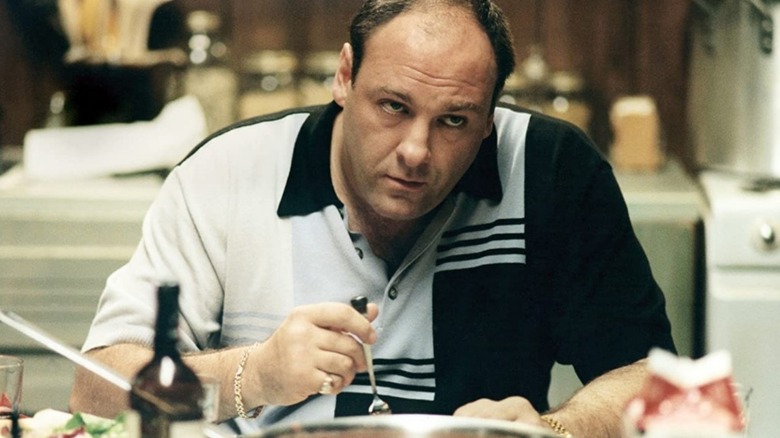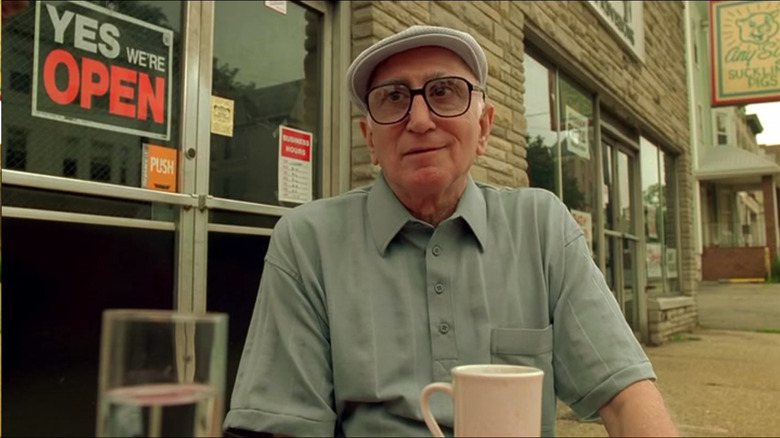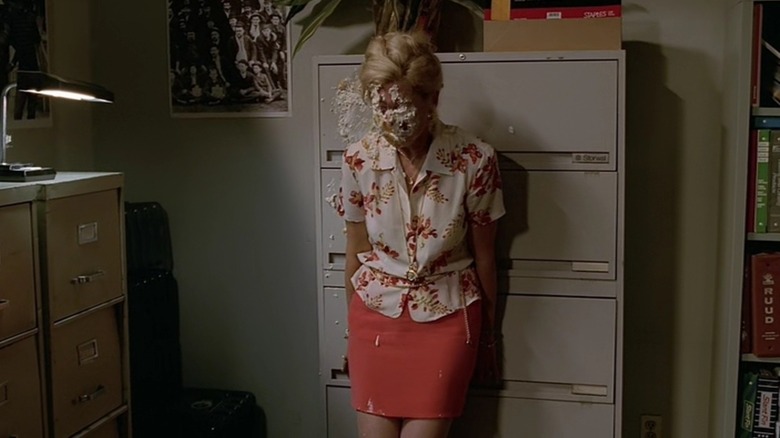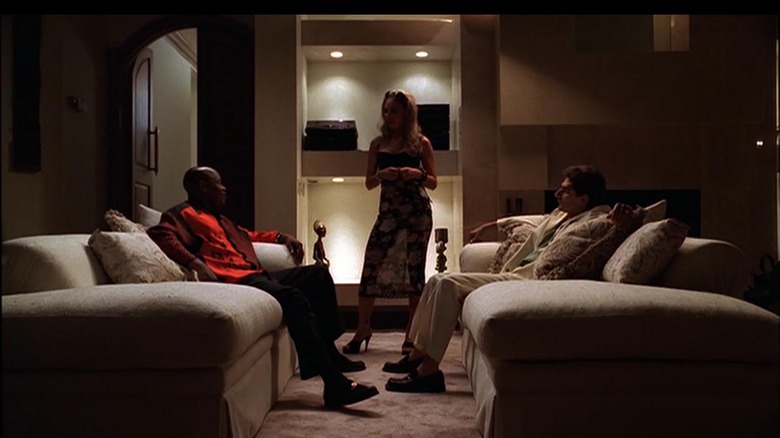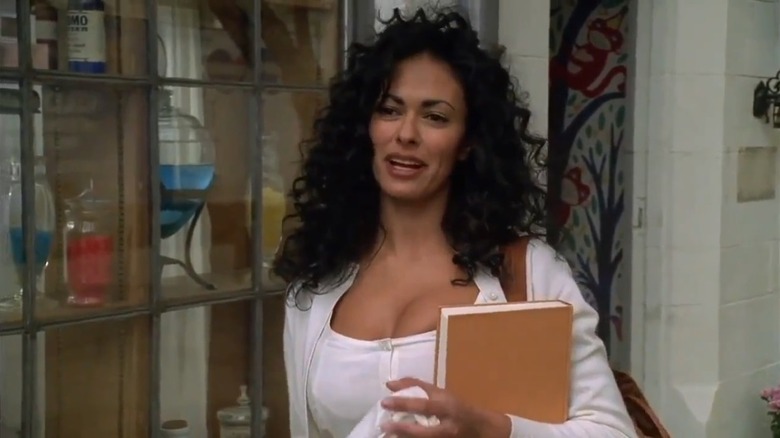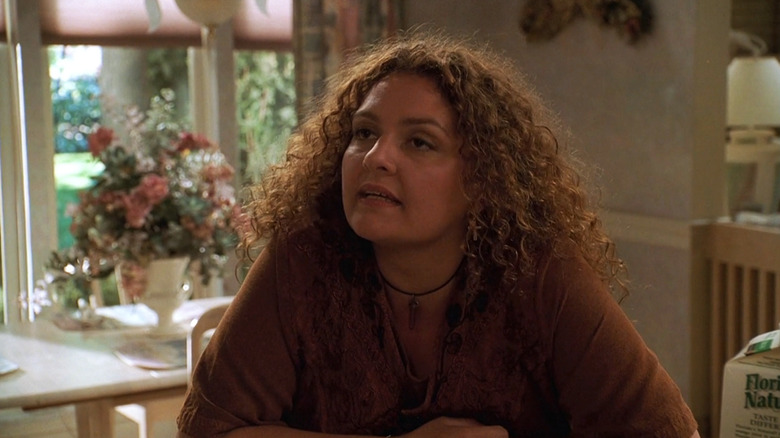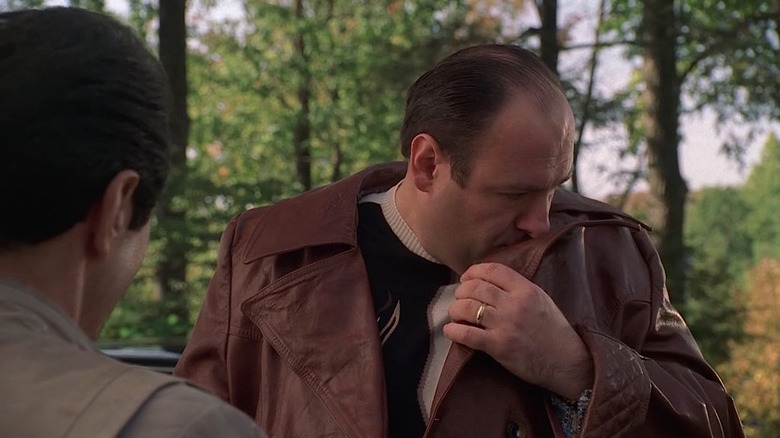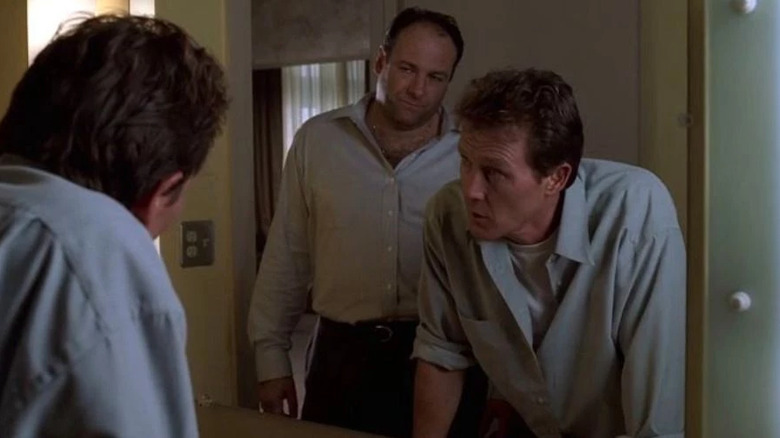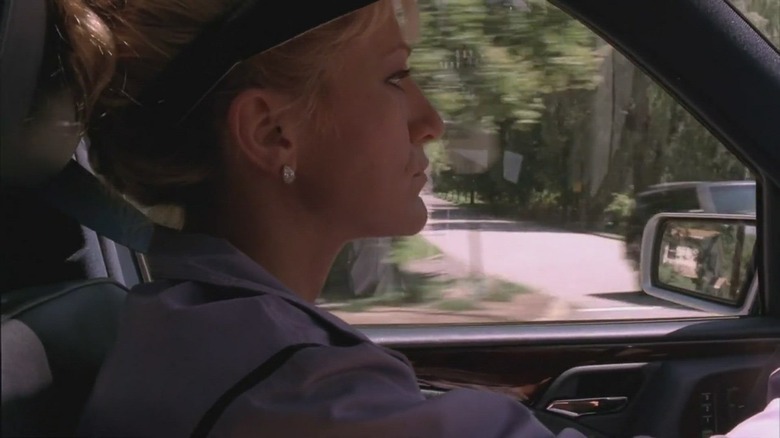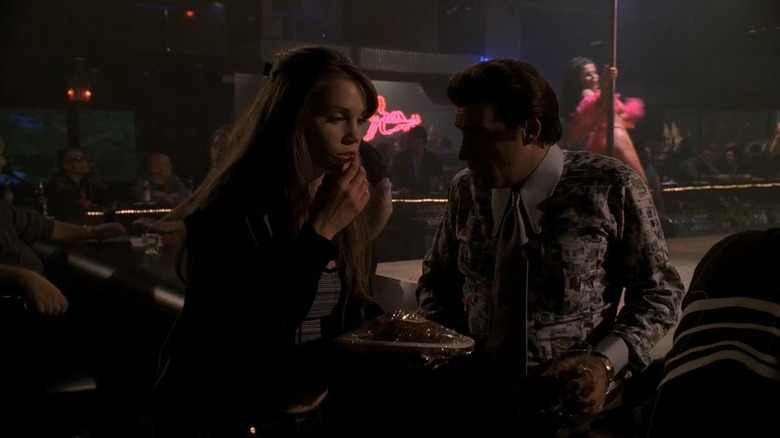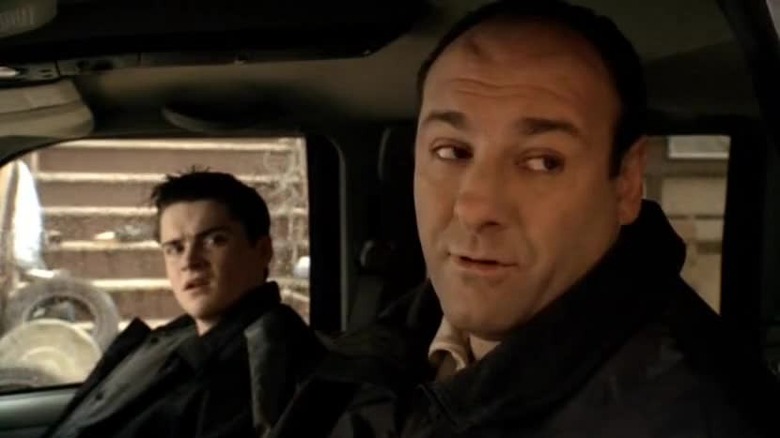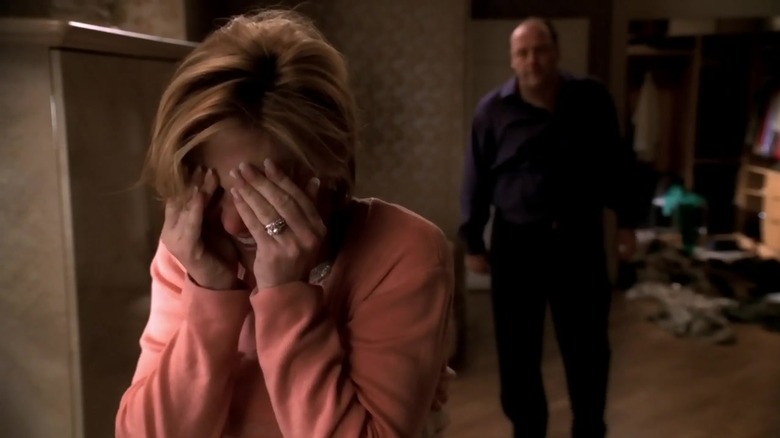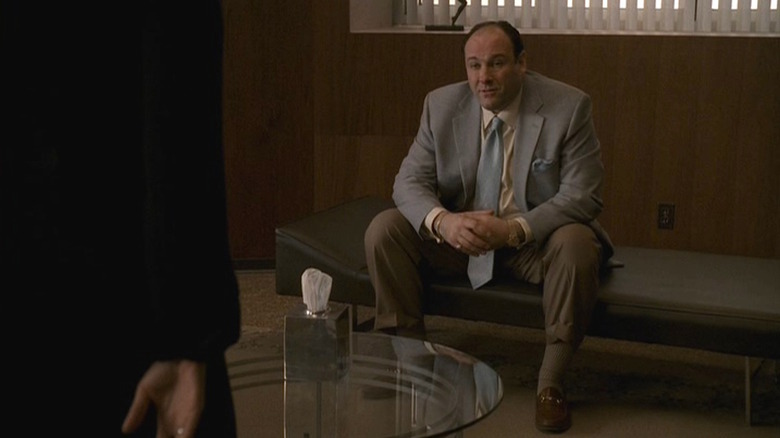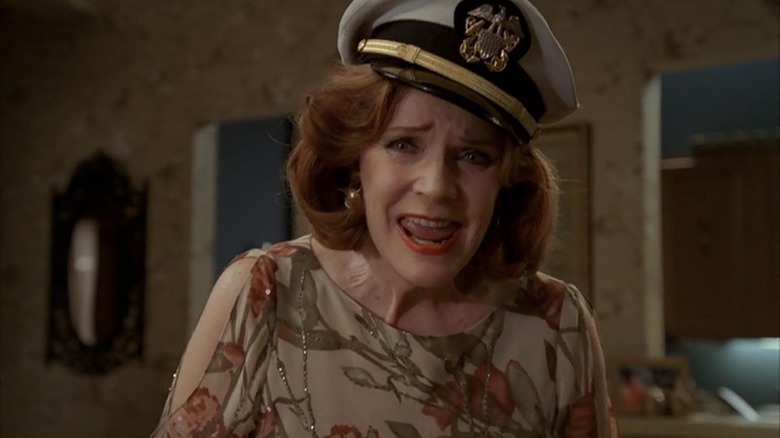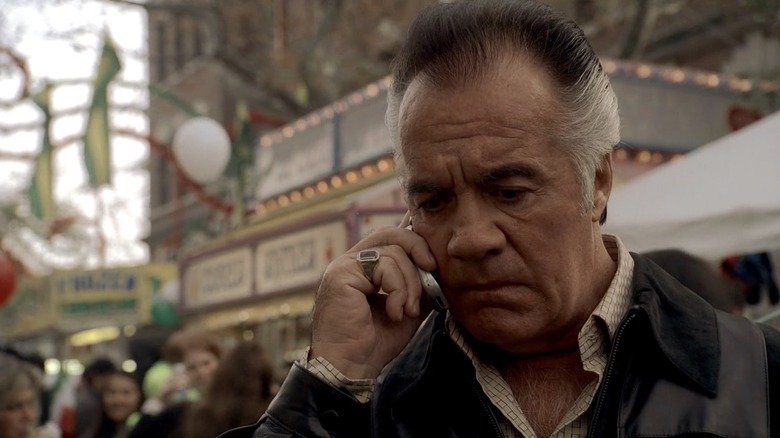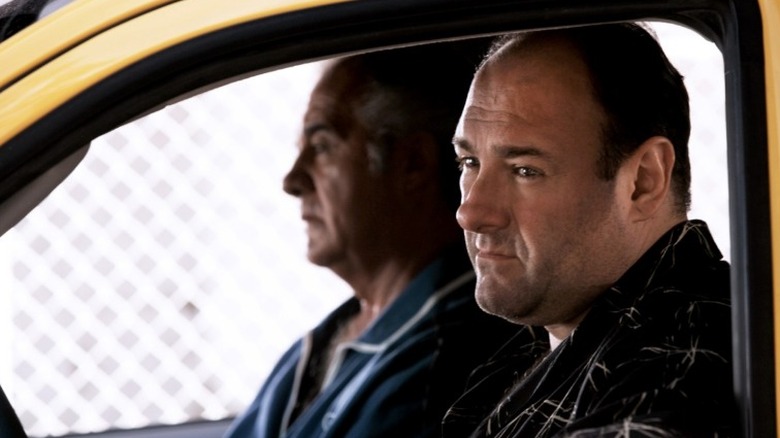15 Underrated Episodes Of The Sopranos
Before there was prestige TV, there was "The Sopranos." The series effortlessly blends brilliant dialogue with complex, serious plots, proving from the beginning that its creative team trusted the intelligence of their audience. It is continuously ranked near the top of best-of lists, and has been awarded every trophy in the game, including 21 Emmys and two Peabody Awards. "The Sopranos" was the first cable series to win an Emmy for outstanding drama, while leads James Gandolfini and Edie Falco took home three Emmys each. It's a show that changed how we think about television — without it, we likely wouldn't have gotten "Mad Men," "Breaking Bad," or any of the other antihero-driven dramas that defined TV in the '00s and '10s.
There are many words that you can use to describe "The Sopranos," but one that rarely comes up is "underrated." However, not every episode gets the acclaim it deserves. What makes an episode of "The Sopranos" underrated, anyway? Does it highlight a supporting character? Take a break from business to focus on Tony's other family? Exist in an alternate timeline? Finding the most underrated episodes of a series with this much critical acclaim is tough, but I've given it a shot regardless. Here we go!
46 Long
A great pilot introduces our main characters, kicks off the drama, and paints a picture of the world we are about to inhabit in 50-minute chucks. Naturally, "The Sopranos" nailed it. However, many shows take a few episodes to really find their footing, and I believe that viewers needed this episode as much as the pilot to convince them to stick around.
In "46 Long," Tony's mother, Livia, accidentally sets her kitchen on fire while sautéing mushrooms. Not only does this scene encapsulate the dynamic between Livia and Tony, who she criticizes on the phone for not calling enough, but the fire lands her in a nursing home — or a "retirement community," depending on who you ask. That's one of the great recurring lines that appears throughout the series; the "Sopranos" creative team clearly knew how to establish a lexicon of inside jokes and callbacks that would repeatedly pay off over multiple seasons.
A subplot follows wise guys Paulie Walnuts (the late, great Tony Sirico) and Big P**** as they track down a stolen car that belongs to one of A.J.'s teachers, hoping to raise the struggling teenager's grades. When they stake out a chain coffee shop where they think the thief works, Paulie argues that the cafe exploits their Italian heritage. It begs the question: Can espresso be appropriated? It's a great moment in which the characters comment on stereotypes in the Italian community, a recurring theme throughout the series, and an opportunity to preemptively deflect criticism from the show's haters. In 2001, a Chicago-based organization actually sued "The Sopranos" over its portrayal of Italian-Americans. But "The Sopranos" was always in on the joke, and with the coffee shop execution, the creative team took steps to ensure that viewers knew it.
Boca
When I asked some friends what they considered the most underrated episode of "The Sopranos," they all replied, "The one where Junior goes down on his mistress, and everyone finds out." While that might sound more like the title of a "Friends" episode, it's nonetheless the setup for one of the most delightfully enjoyable episodes of the show's entire run.
Tony, Silvio, and Artie become voracious soccer dads, while Uncle Junior takes his longtime goomah — that's "The Sopranos" for "mistress" — to Boca. However, Junior's girlfriend, Roberta, can't keep her mouth shut, and tells everyone at the salon that Junior likes to perform oral. This gets back to Carmela, who brings it up at dinner after Junior returns from Florida. It's one of the weirdest scenes in any series; the last thing I would ever do is bring up the sexual proclivities of a family member to said family member. But Carmela does it anyway! What's great about this seemingly standalone storyline is that Junior's embarrassment ends up cementing his desire to dethrone Tony. As is often the case on "The Sopranos," pride gets in the way of logic.
Yes, it's legitimately sad when Junior breaks up with Roberta by shoving a pie in her face, but I expected him to whack her, so I felt unexpected relief that she ended up with nothing worse than some baked goods dripping off her nose.
A Hit Is a Hit
Although Adriana (portrayed flawlessly by Drea de Matteo) doesn't really get to shine until her final season, "A Hit Is a Hit" provides an early example of her ambition. With the help of Massive Genius, a rapper with ulterior motives, Adriana and Christopher try to make it in the music business. Massive uses the couple to get close to mob insider Hesh, hoping to convince Hesh to pay reparations to the Black artists he took advantage of when he was a producer. It's a compelling, timely narrative that makes a lot of sense in 2022, and I'd love to know how this storyline was received back in 1999. It's one of the only times that "The Sopranos" effectively brings race into the conversation, and I'm glad it did.
Hesh knows that Massive is correct in what he's asking, but he still decides not to pay the reparations. "The Sopranos" never disappoints when it comes to creating a compelling anti-hero. What I also love about this episode is that I get to watch what a mobster does on his day off. Despite making a lifelong commitment to the Mafia, Christopher has a creative drive that he wants to explore. "A mobster who wants to be a writer" could have been the setup for an entire series, had David Chase and crew not gone with "a mobster who sees a shrink."
Isabella
"Isabella" is the first time that the "Sopranos" creative team drops us in a dreamlike reality, and while it might not be as successful as the Kevin Finnerty storyline, I love how it lays the groundwork for what's to come in Tony's psyche.
Tony is depressed, so Dr. Melfi decides to up his medication. Around the same time, Tony meets Isabella, a dentistry student who's house-sitting for the Sopranos' next-door neighbors, the Cusamanos. When I first watched "Isabella," I was so bored. I didn't care that Tony was pursuing this woman. I wanted to get back to the action: Livia and Junior planning a hit on Tony.
But then, at the end of the episode, Tony asks Bruce Cusamano what happened to Isabella, and we learn that she never existed. It's a turning point in the series, one that I didn't appreciate on my initial viewing; today, of course, I pretend that I knew all along that it was an existential fever dream. "Isabella" is a trailblazer in "The Sopranos" universe, and for that reason it deserves much more love.
Guy Walks into a Psychiatrist's Office
I have one word for you: Janice.
After a perfect first season, I had high expectations for season 2, and this episode didn't initially wow me. The season 2 opener plays catch up with the previous season's storylines; it's not until Richie Aprile is released from prison two episodes later that the newest mob drama really begins. For the first episode back, I wanted more than Frank Sinatra singing "It Was a Very Good Year" while we watched a montage of the characters. Still, at least I got Janice.
After Livia's all-too-convenient stroke, Tony's estranged, opportunistic sister Janice returns to New Jersey. Played by the wickedly talented Aida Turturro, Janice immediately gets under everyone's skin, including the viewer's. Like her mother, Janice is a master manipulator, and she'll use her skills to make Tony's life miserable for the rest of the series.
In her first appearance, Janice claims that she's coming home to care for Livia, but Tony suspects that she wants to be closer to her inheritance. She doesn't have any money of her own, of course, and it's shocking when she successfully shakes Tony down for a couple hundred. We don't learn until later seasons why Tony struggles to say no to Janice, despite how much she infuriates him, and that's part of what I love about her arrival: There is so much depth to the Soprano women. Even a hardened crime boss like Tony can't stand up to them.
Full Leather Jacket
I think the plot of "Full Leather Jacket" was also a "Seinfeld" episode. Richie gifts Tony a leather jacket that he claims Tony admired as a boy. It's an obvious ploy to gain favor with the boss, who sees right through Richie, but politely takes the jacket anyway. But the coat is only one part of Richie's plan. He also starts dating Janice, which allows him to get even closer to Tony. Richie is a perfect villain because he's as slimy as his greased hair.
But then, Richie learns that Tony has gifted the jacket to his housekeeper's husband. At this point, it's pretty clear that Richie resents Tony's authority, and this act pushes him even further over the edge. It also mirrors the gossip regarding Junior's sexual predilections in "Boca"; to experienced "Sopranos" viewers, it's pretty clear where this whole thing is going.
Another storyline follows Carmela's attempts to get Meadow into Georgetown. In a bizarre move, Carmela asks her neighbor, Jeannie, to ask her sister Joan — a Georgetown alumnus — to write Meadow a letter of recommendation. Joan declines; it's kind of weird to write a letter for someone you don't know, after all. But Carmela persists, showing up at Joan's office with a pie and a coded threat. Joan interprets this gesture as an offer she can't refuse and writes the letter. It's one of the first times that Carmela wields her power and I love to watch it, even if the premise is ridiculous.
Bust-Out
According to CNBC, a "bust-out" occurs when the mob "moves in to take control of a business that's heavily indebted to a loan shark." It's something that happens subtlety in some "Sopranos" episodes. For example, Tony came into possession of Satriale's because the original owner couldn't pay his debts to Tony's father. In this episode, however, we see a bust-out unfold in precise detail, giving us a glimpse of Tony at his most sociopathic. Tony's childhood buddy, a gambling addict named David, ends up owing a huge debt to the mobster, and once there's money on the line, Tony stops seeing him as an old friend. In order to earn back the cash, the mob takes over David's sporting goods store and forces him to order products that he's not allowed to sell. It's basically impossible for David to get out of the hole he's dug for himself. That's the sick twist of a bust-out: There is no way to escape.
"Bust-Out" offers a great glimpse into the day-to-day workings of the mob, and shows how organized crime negatively affects those outside of the business. It's also filled with treats for viewers who are paying close attention. At one point,the mobsters bully David into ordering a particular brand of sparkling water; later, Artie serves David's wife the same water during a lunch date with Carmela.
Mr. Ruggierio's Neighborhood
In the season 3 opener, we temporarily shift our focus to the FBI's attempt to take down Tony. Thus far, we'd only had brief glimpses of the FBI's operation, but "Mr. Ruggierio's Neighborhood" goes all-in, chronicling the agency's attempt to place a bug in Tony's basement. It's a lighthearted episode that pokes fun at the mystery and espionage genres, but by presenting the episode from the perspective of the "good guys," the show also tests its audience. Are you rooting for Tony Soprano to succeed, or are you hoping he'll face justice for his crimes?
I believe I watched "The Sopranos" for the first two seasons with some antipathy. I saw Tony's life play out with a detached curiosity, and assumed that, when his day of reckoning arrived, I would be glad to see his demise. That changed when I watched the FBI sneak into his house, and discovered that I was, and had always been, on Tony Soprano's side. I had been rooting for the bad guy the whole time, and all it took was an episode focused on his opponents to make me realize it.
University
While "The Sopranos" is known for its strong women, they don't usually get as much screen time as the men. For the most part, for example, Meadow's college life takes a backseat to the mob drama. "University," however, chronicles Meadow's clashes with her elitist boyfriend, Noah, and her unhinged roommate, Caitlin. "The Sopranos" has been building to Caitlin's mental breakdown since her first appearance, but her relationship with Meadow is never given enough time to fully develop. I thought they would go full "Single White Female" with Caitlin, but her arc ends when Noah gets his father to file a restraining order against her because Noah blames Caitlin for getting a bad grade (oh, to be rich).
In reality, the main focus of this episode is another woman, Tracee, who works as a dancer at the Bada Bing, and who is sleeping with bad guy Ralphie Cifaretto. Tracee bakes bread for Tony in a scene that is as awkward as it is strong. Tony repeatedly tries to set boundaries with Tracee — as he explains, he can't be friends with the dancers. But Tracee, who's clearly lonely, doesn't understand. She's a tragic character from the jump, in debt to Silvio, who loaned her money for braces, and treated poorly by Ralphie. When she finally stands up to Ralphie, I was excited, and then I was scared. Rightly so, as it turns out: After their fight, Ralphie follows Tracee into the Bing parking lot and beats her to death. It's a gruesome and tragic scene, and one that stayed with me long after my initial viewing.
Watching Too Much Television
Tony's anger is a constant source of drama, and this episode thrives because of it. Trained method actor James Gandolfini was known to put rocks in his shoes, hit himself, and even deprive himself of sleep in order to capture Tony's fury. In "Watching Too Much Television," Tony learns that the crooked politician in his pocket, Assemblyman Zellman, has started a relationship with Tony's former mistress, Irina. Although Tony pretends to be okay with this arrangement, he shows up at Zellman's apartment and beats him with a belt. I love it when Tony snaps because it calls back to all the times when he managed to restrain himself. Tony is always on the verge of violence, and James Gandolfini gives a masterclass here in how to capture anger, mania, and recklessness.
"Watching Too Much Television" also follows Paulie Walnuts, fresh out of jail and frustrated that he's not getting enough attention. Remember, wise guys are sensitive people. They have fragile egos! That, not business, is largely why they kill people. Paulie ends up visiting Johnny Sack in New York City to gossip and lament his situation. But Paulie's meddling often causes tension with the New York family, and this is a subtle harbinger of the troubles to come. Just a few episodes earlier, Paulie told Johnny Sack that people were making fun of his wife, Ginny. Is that tasteless joke part of the motivation for the later conflict between New York and New Jersey? This author thinks so.
Whitecaps
The influence of theater on "The Sopranos" is undeniable. David Chase melds tragedy with comedy in ways that can't help but evoke Arthur Miller's "The Death of a Salesman" and Tennessee Williams' "A Streetcar Named Desire." Nowhere is this clearer than in "Whitecaps," the 4th season finale of "The Sopranos." Typically, TV shows favor shorter scenes that keep the action flowing, but the confrontation between Tony and Carmela plays out in a long, uninterrupted segment that feels like it came from a stage play.
Tony and Carmela's fight is raw, catastrophic, compelling, and remarkably private. It almost feels like we shouldn't be watching it, and yet, we can't turn away. Tony and Carmela unleash more than four seasons' worth of rage and resentment on each other, and we just know that nothing will ever be the same again. This time, a fancy dinner or piece of jewelry will not solve their problems. Adding to the sadness is the summer house that the Sopranos buy. Although they imagine all the memories they'll create there, the family breaks up before they have an opportunity to spend a single night together.
Two Tonys
When I first watched "The Sopranos," I didn't understand why Tony and Dr. Melfi never got together. Beyond the ethical concerns, I believed that they were so drawn to each other that something had to happen, right? But then I rewatched the series a second time, and I was so glad that the producers never had them engage in an affair. "Two Tonys" is the closest that we get, and it veers awfully close to fan fiction.
What makes this episode underrated, however, is how naturally it flows as it shows us what a trial separation looks like for a modern mob family. While there are stronger season openers — particularly "Pilot," "Members Only," and "Soprano Home Movies" — this is one of the most nuanced and saddest episodes, as it focuses largely on the fallout from "Whitecaps." This episode also introduces several wise guys who are released from prison after a crackdown in the '80s. Their arrival forever alters the show's trajectory, and sets in motion the conflict between New York and New Jersey that'll come to a head in season six.
In Camelot
While visiting his father's grave, Tony runs into Fran Felstein, one of Johnny Soprano's mistresses. After "Isabella," some might wonder if Fran is even real, but this episode plays with our sense of reality in a different way, asking us to question whether or not Fran is telling the truth. Fran invites Tony to her apartment and regales him with stories. She claims to have also been a girlfriend of John F. Kennedy — she even kept one of his hats (which is itself a throwback to Tony's captain hat). Fran feels like a walking performance piece, luxuriating in the storytelling while Tony gladly gets lost in the past.
What I love about "In Camelot" is that it dares to tell a different sort of mob story. Many Mafia narratives end in the arrest or death of their male protagonists, but Fran doesn't stop existing just because Johnny Soprano died. I love seeing the life that she carved out for herself in the aftermath of tragedy. It's like she's curating a living museum of the past. The only problem? I wanted more.
The Ride
One of my favorite parts about "The Ride" is that it takes place in the fall, a season we don't experience enough on "The Sopranos." In "The Ride," our family of dysfunctional mobsters attends a classic Italian feast, allowing their storylines to naturally weave in and out of the episode as they visit the fair. It's also a great Paulie episode. We learn that running the fair has long been a lucrative gig for him, but a new priest threatens to end Paulie's reign if he doesn't make a larger donation to the church. To cut down his costs, Paulie hires a cheaper company to handle the fair's rides, which leads to an accident that almost hurts Janice's baby daughter (and provides us with some delightful angry Janice moments). Paulie also runs into his now-estranged mother, who he hadn't seen since cutting ties with her after learning that she wasn't his birth mother.
I love watching Paulie deal with crisis after crisis. His exhaustion is palpable, particularly when he learns that he needs to undergo a biopsy. The later episodes of "The Sopranos," like this one, adroitly explore what happens when Mafia members begin to age, as well as the fear that they all have: that the best parts of their lives have already happened. There's also an added layer of comfort in seeing the Soprano family attend this gathering together, even with so much drama going on beneath the surface.
Remember When
What I love most about Tony Soprano always being seconds away from snapping is the tension that occurs when he doesn't crack. And so, we have "Remember When," a late series episode focusing on Tony and Paulie. It's underrated by its very premise: It ignores the main action of the season — the impending war with New York — in favor of a standalone episode in which Tony and Paulie hide out in Miami. A murder they committed in the '80s has recently been uncovered, so they plan to lie low. However, Tony soon realizes that Paulie is exhausting to be around. Paulie fills every void with commentary; when he's not lamenting the continental breakfast, he's regaling Tony with stories from the past. Basically, he won't shut up. As a viewer, I start to question how long it'll be before Tony decides to kill him (we are in the final season, after all). That Paulie survives "Remember When" is one of the series' most underrated twists.
This episode plays the whole thing like a mismatched buddy comedy. Tony questions why he's allowed this person to exist in his life, while Paulie uses nostalgia to make peace with his present. I also love this episode because it highlights the work that Tony does in therapy, which stands in stark contrast to Paulie, who doesn't allow himself any opportunities for self-reflection. It's a beautiful episode, and an underrated installment of one of the greatest shows of all time.
